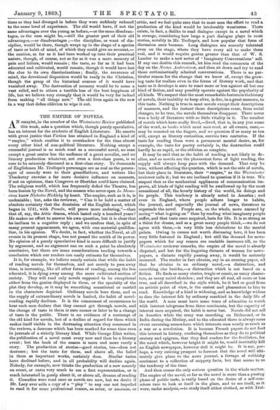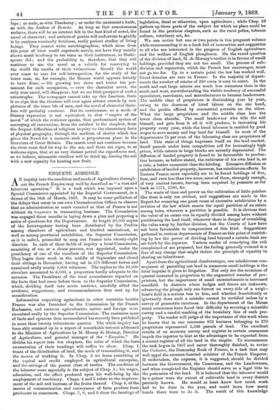THE EMPIRE OF NOVELS
AN essayist, in the number of the Westminster Review published this week, asks a question which, though purely speculative, has an interest for the students of English Literature. He asserts with great justice that Fiction has attained in England a kind of 44 empire," which enables it to overshadow for the time almost every other kind of non-political literature. Nothing except a successful journal is so much read as a successful novel, no man except a great orator has the audience of a great novelist, and no literary production whatever, not even a first-class poem, is so sure to be minutely discussed as a first-class story. To thousands of Englishmen Mr. Trollope's personages are as real as the personages of comedy were to their grandfathers, and writers like Thackeray exercise a far more decisive influence on manners, if not on opinions, than Congreve or Sheridan could have claimed. The religious world, which has frequently defied the Theatre, has been beaten by the Novel, and the masses who never open In Memo.riam know Nicholas Nialdeby by heart. The empire, such as it is, is undeniable ; but, asks the reviewer, "Can it be held a matter of -absolute certainty that the dominion of the English novel, which began in 1741, with Pamela, will prove more enduring,"—than that of, say, the Attic drama, which lasted only a hundred years? He makes no effort to answer his own question, but it is clear that -he inclines to a negative reply ; and we confess that, in spite of many present appearances, we agree, with one material qualification, in his opinion. We doubt, in fact, whether the Novel, at all events in its present shape, has not passed the zenith of its power. No opinion of a purely speculative kind is more difficult to justify by argument, and no argument can on such a point be absolutely conclusive, but there are -some considerations tending towards a -.conclusion which our readers can easily estimate for themselves.
It is, for example, we believe nearly certain that while the habit -of reading novels for themselves, and not merely to pass away time, is increasing, like all other forms of reading, among the less educated, it is dying away among the more cultivated section of -society. They will read only novels supposed to be exceptional either from the genius displayed in them, or the specialty of the plot they develop, or it may be something sensational or morbid in the characters depicted. Ordinary novels bore them, and as the supply of extraordinary novels is limited, the habit of novel. reading rapidly declines. It is the commonest of occurrences to hear such men declare that they cannot get through novels, and the change of taste in them is sure sooner or later to be a change -of taste in the public. There is no evidence of a contempt of the old kind for novels, but of a decline of regard for them which makes itself visible in the decreasing attention they command in the reviews, a decrease which has been marked for some time even in journals of a strictly literary kind. While George Eliot writes, the publication of a novel must every now and then be a literary event ; but the book of the season is more and more rarely a story. The production of stories—good stories, too—does not decrease ; but the taste for them, and above all, the belief in them as important works, certainly does. Similar tastes have declined before, and in all probability will decline again. Nobody, for example, now thinks the production of a new comedy an event, or cares very much to see a first representation, or is much interested in gossip about it, or above all, dreams of reading it. Comedies were read once as novels are now, but we doubt if Mr. Lacy ever sells a copy of a " play " to any one not impelled to read it for some professional reason, as actor, or amateur, or
critic, and we feel quite sure that to most men the effort to read a production of the kind would be intolerably wearisome. There exists, in fact, a dislike to read dialogue except in a novel which is strange, considering how large a part dialogue plays in most stories, notably in Mr. Trollope's, and how popular that form of discussion once became. Long dialogues are scarcely tolerated even on the stage, where they have every aid to make them real, and it would require genius greater than that of W. S.
Landor to make a new series of 'Imaginary Conversations' sell.
If any one doubts this remark, let him read the comments of the day on the Noctes Ambrosianfe, and then sit down and try to read those enthusiastically admired conversations. There is no par ticular reason for the change that we know of, except the growing taste for realism even in the forms of literary work, and that taste as it develops is sure to react more or less against all but one kind of fiction, and may possibly operate against the popularity of all kinds. We suspect that the most remarkable feature in thehistory of novels, their inability to keep alive, is due, in a great measure, to this taste. Nothing is true in most novels except their descriptions of manners, and the instant those descriptions cease, from social changes, to be true, the novels themselves disappear. There never was a body of literature with so little vitality in it. The number of novels which have really lived,—lived, that is, in any just sense of the word, as books which most men read, at all events, once,— may be counted on the fingers, and we question if so many as ten will, except as literary curiosities, survive two centuries. If the taste for reading them were a permanent mental desire, as, for example, the taste for poetry certainly is, the destruction could hardly be so rapid, or the oblivion so complete.
It may be said that as the habit of reading is not likely to decline, and as novels are the pleasantest form of light reading, the supply will always keep pace with the demand. That may be true, without affecting the question, which is not the sale of novels, but their place in literature, their "empire," as the Westminster reviewer calls it ; but we are inclined to question if it is true. We suspect that as the mechanical appliances of communication improve, all kinds of light reading will be swallowed up by the most sensational of all, the hourly history of the world, its doings and its people. This tendency is already noted in America ; and even in England, where people adhere longer to habits, the journal, and especially the journal of news, threatens to supersede the novel. People are, on the whole, more amused by seeing "what is going on" than by reading what imaginary people suffer, and that taste once acquired, lasts for life. It is as strong as a thirst for drams, and as a great many people think,—we do not • agree with them,—is very little less deleterious to the mental palate. Owing to causes not worth discussing here, it has been very little fostered in England ; but still the demand for newspapers which for any reason are readable increases till, as the Westminster reviewer remarks, the empire of the novel is already disputed, and but for the lingering distaste of women for newspapers, a distaste rapidly passing away, it would be seriously menaced. The reader in fact obtains, say in an evening paper, all that he obtains in an ordinary novel,—a distraction, and something else besides,—a distraction which is not based on a fiction. He finds as many stories, tragic or comic, as many characters, as many social sketches ; and they are all real, all more or less true, and all described in the style which, be it bad or good from an artistic point of view, is the easiest and pleasantest to him to read. Knowledge of a kind is widening, and as knowledge widens so does the interest felt by ordinary mankind in the daily life of the world. A man must have some trace of education to watch with interest telegrams from three continents, but the capacity of interest once acquired, the habit is never lost. Novels did not sell in America while the army was marching on Richmond, or in India during the Mutiny, and to the educated there is always some event occurring somewhere which interests men nearly as much as a war or a revolution. It is because French papers do not feed this interest in history, confining themselves as they do to political oratory and epigram, that they find readers for the feuilleton, for • the novel which, however bright it might be, would inevitably kill an English newspaper, however dull it might be. It is not, perhaps, a very enticing prospect to forecast that the novel will ultimately give place to the news journal, a farrago of rubbishy sentiment to a collection of snippety facts, but that seems to na the tendency of the time. And then comes the only serious question in the whole matter. The empire of the novel, so far as the novel is more than a passing phase of public taste, is really based on the desire of a self-conscious race to look at itself in the glass, and to see itself, as it were, under analysis,—to study itself either clothed, as with 'frol
lope ; or nude, as with Thackeray ; or under the anatomist's knife, as with the Author of .Romola. As long as that consciousness endures, there will be an interest felt in the beat kind of novel, the novel of character; and authors of genius will endeavour to gratify it by analyses nominally fictitious, really patient studies of living beings. They cannot write autobiographies, which alone from this point of view could supersede novels, nor have they usually shown much tendency to use verse as their instrument, as Shakespeare did ; and the probability is, therefore, that they will continue to use the novel as a vehicle for conveying to the world the results of their vivisectioas. Should the world ever cease to care for self-introspection, for the study of the inner man, as, for example, the Roman world appears latterly to have done, — life growing too stern and terror too permanent for such occupation, — even the character novel, the only true novel, will disappear ; but we see little prospect of such a catastrophe. The newspaper cannot take up this function, there is no sign that the theatres will ever again attract crowds by new pictures of the inner life of men, and the novel of character therefore will probably continue. But its continuance as a mode of literary expression is not equivalent to that "empire of the novel" of which the reviewer speaks, that predominant system of conveying all instruction, from the subtlest to the simplest, from the deepest difficulties of religious inquiry to the elementary facts of physical geography, through the medium of stories which has given the Novel for a moment such a preposterous place in the literature of Great Britain. The marsh need not continue because the river must find its way to the sea, and there are signs, to us welcome signs, that at no very distant period the superfluous and, as we believe, miasmatic overflow will be dried up, leaving the soil with a new capacity for bearing new fruit.



































 Previous page
Previous page